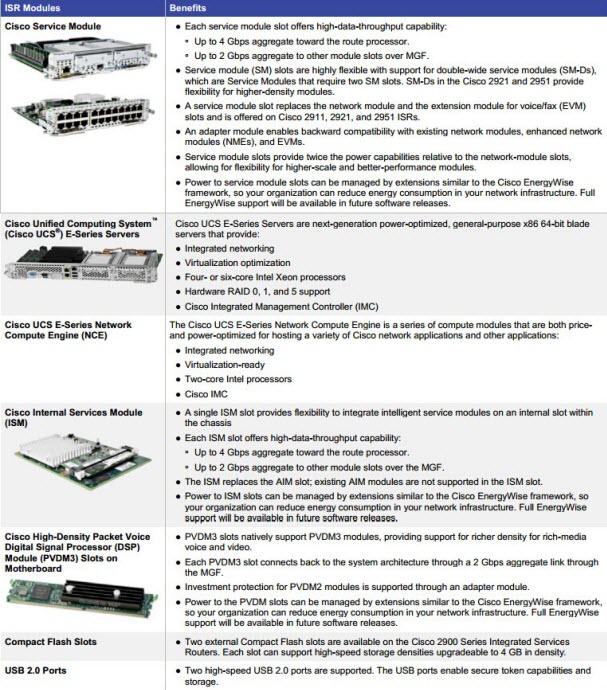
By offering four platforms: the Cisco 2901, 2911, 2921, and 2951 routers, Cisco 2900 series router builds on the previous Cisco 2800 Series Integrated Services Routers(It was already end of life and end of sale.)
Designed for today’s medium-sized branches and with the purpose of evolving to cloud-based services, all the Cisco 2900 models offer embedded hardware encryption acceleration, voice-and video-capable digital signal processor (DSP) slots, optional firewall, intrusion prevention, call processing, voicemail, and application services.
Cisco 2900 router models have main common features, such as Firewall protection, VPN support, MPLS support, Syslog support, IPv6 support, Class-Based Weighted Fair Queuing (CBWFQ), Weighted Random Early Detection (WRED), Web Services Management Agent (WSMA), NetFlow, but in details, they are different. How to choose the most suitable one among the four Cisco 2900 platforms? Here, we do a general comparison of Cisco 2901, 2911, 2921 and 2951 router to help you pick out the very right Cisco 2900 model.

Cisco 2900 MODEL Comparison: Cisco 2951 vs. 2921 router vs. Cisco 2911 vs. Cisco 2901
|
|
Cisco 2951 |
Cisco 2921
|
CISCO 2911 |
Cisco 2901 |
|
|
Form Factor |
2 RU |
2 RU |
2 RU |
1 RU |
|
|
Integrated WAN Ports |
3 Gigabit Ethernet |
3 Gigabit Ethernet |
3 Gigabit Ethernet |
2 Gigabit Ethernet |
|
|
Interface slots (enhanced high-speed WAN interface card [EHWIC]) |
4 |
4 |
4 |
4 |
|
|
Interface Slots, Network Interface Modules |
N/A |
N/A |
N/A |
N/A |
|
|
Service-module slots |
2 |
1 |
1 |
0 |
|
|
Integrated services module (ISM) slots |
1 |
1 |
1 |
1 |
|
|
Packet-voice data-module (PVDM) slots |
3 |
3 |
2 |
2 |
|
|
USB Ports (v2.0) |
2 |
2 |
2 |
2 |
|
|
Default/maximum flash memory |
256 MB/ 8 GB |
256 MB/ 8 GB |
256 MB/ 8 GB |
256 MB/ 8 GB |
|
|
Default/maximum synchronous dynamic RAM (SDRAM) |
512 MB/ 4 GB* |
512 MB/ 2.5 GB |
512 MB/ 2.5 GB |
512 MB/ 2.5 GB |
|
|
Modular LAN switchports (with optional Power over Ethernet) |
50** |
50** |
24** |
16 |
|
|
Advanced Security |
Enabled via security license for the Universal IOS image. IPS and content filtering need additional subscription licenses. |
||||
|
Stateful Firewall |
Yes |
Yes |
Yes |
Yes |
|
|
Intrusion Prevention |
Yes |
Yes |
Yes |
Yes |
|
|
Content Filtering |
Yes |
Yes |
Yes |
Yes |
|
|
Voice and Video DSP support |
PVDM3 and PVDM2 |
PVDM3 and PVDM2 |
PVDM3 and PVDM2 |
PVDM3 and PVDM2 |
|
|
Survivable Remote Site Telephony (SRST) |
Up to 250 |
Up to 100 |
Up to 50 |
Up to 35 |
|
|
Cisco Unified Communications Manager Express |
Up to 150 |
Up to 100 |
Up to 50 |
Up to 35 |
|
|
Cisco Unity Express (network module [NM], service module [SM], or ISM) |
32 ports; 300 mailboxes |
32 ports; 300 mailboxes |
32 ports; 300 mailboxes |
10 ports; 100 mailboxes |
|
|
Session Initiation Protocol (SIP) sessions |
600 |
400 |
200 |
100 |
|
|
Digital Voice Support |
Up to 400 |
Up to 240 |
Up to 150 |
Up to 100 |
|
|
Maximum voice support for analog and Basic Rate Interface (BRI) |
FXS 64, FXO 40, BRI 24 |
FXS 40, FXO 28, BRI 16 |
FXS 40, FXO 28, BRI 16 |
FXS 16, FXO 16, BRI 8 |
|
More than Cisco 2900 Model Comparison
About the Software Requirements of Cisco 2900 Series
The four Cisco 2900 Series platforms of Cisco 2951, 2921, 2911 and 2901 model run on the IOS Software IP Base.
The Modularity Features and Benefits of Cisco 2900 Series
In fact, most of the modules available on previous generations of Cisco routers, such as the Cisco 2800 Series, are supported on the Cisco 2900 Series. Let’s check the benefits of main Cisco ISR modules as follows.

More Related Cisco ISR G2 Comparison
Cisco 2901 vs. Cisco 1921 vs. Cisco 1941/1941W
Cisco 1921 vs. Cisco 1941 vs. Cisco 1941W
Cisco 4451-X vs. Cisco 3945E vs. 3925E vs. Cisco 3945 vs. 3925 Router





